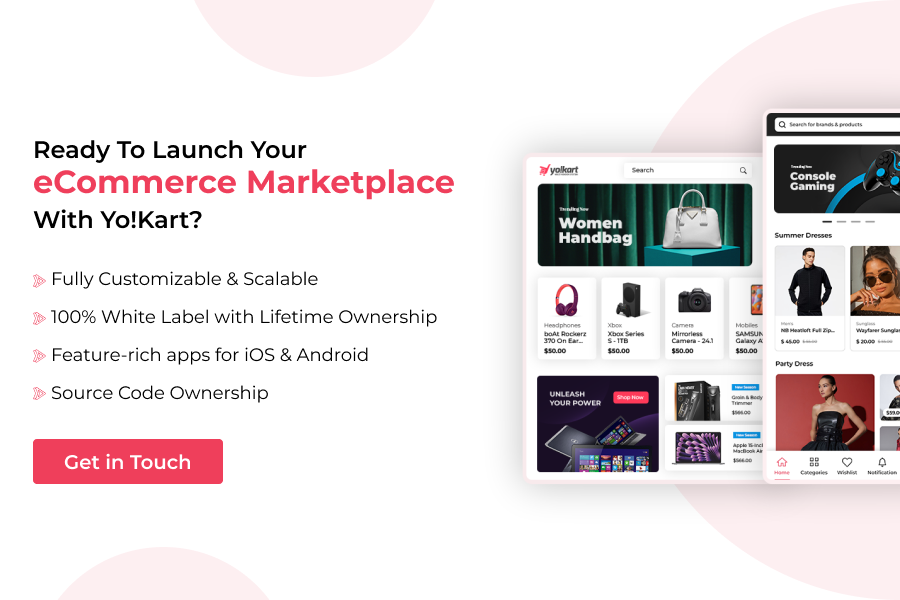Last Updated: 04 September, 2024
Although the B2B industry was slow to adopt online retail, especially when compared to the B2C space―the trend changed gears―riding on the success of eCommerce globally. As technology has been evolving, providing better digital solutions, a cataclysmic evolution in supply chain mechanisms and other eCommerce support infrastructure is powering a continuous progression.
Moreover, key decision-makers in the B2B industry are exposed to the efficiency of eCommerce at multiple levels in their daily lives. They are more willing to explore the extension of the same in their businesses.
These reasons are driving a sustained interest in investing in B2B eCommerce platforms. If you are thinking along similar lines, the big question must be: which is the best B2B eCommerce platform to build an online B2B multivendor website?
In this blog, let’s read about the top modern B2B eCommerce software that allows entrepreneurs to enterprises, launch a modern B2B eCommerce website.
Table of Contents:
What do the numbers reflect for the B2B eCommerce rise?
B2B eCommerce sales are surging as businesses increasingly prefer digital channels over physical retail for their procurement needs. The industry is among the fastest-growing eCommerce sectors with B2B marketplaces like Alibaba.com, Made-in-China.com, Thomasnet.com, and Tradekey leading the charge.
The numbers further validate this trend: According to a survey published on Mckinsey, nearly 80% of B2B buyers prefer remote interactions or digital self-service as B2B sales leaders embrace digital commerce as the next big step for industry growth.
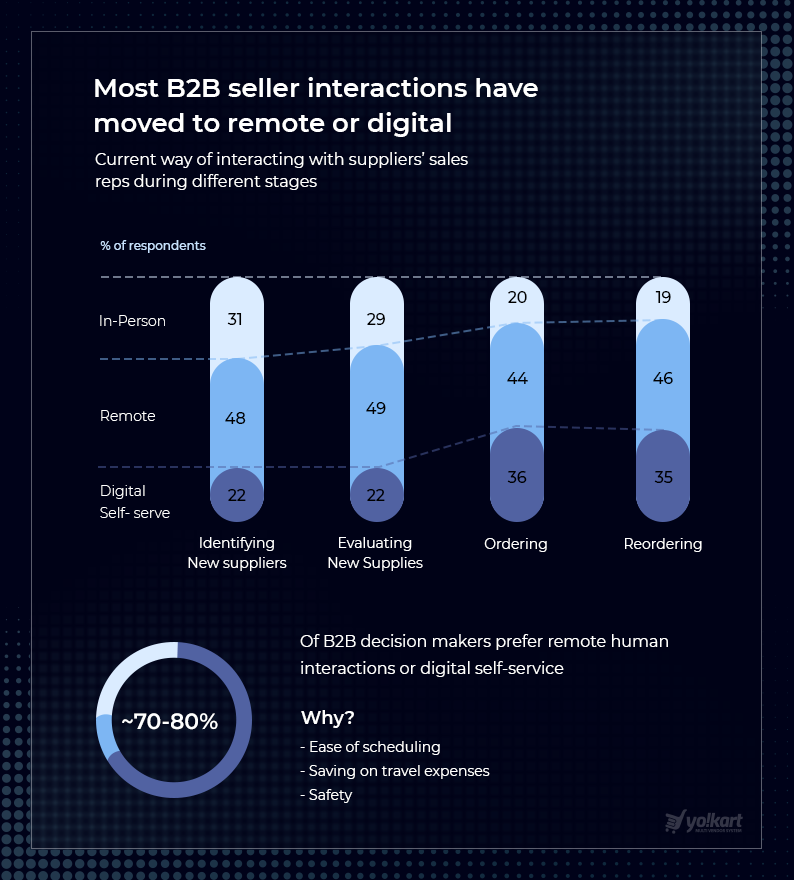
Source: McKinsey & Company
Moreover, according to a report by Grand View Research, the global B2B eCommerce market was valued at $26.163 trillion in 2023 and is expected to reach $56.921 trillion by 2028 growing at a compound annual growth rate (CAGR) of 18%.
This reflects the increasing demand of the B2B industry and an opportunity for aspiring eCommerce entrepreneurs to invest in digital commerce. To capitalize on this demand, businesses are looking for an off-the-shelf B2B eCommerce platform to kickstart their business operations. But first, what is a B2B eCommerce platform? Read to know more.
What are B2B eCommerce platforms?
B2B eCommerce platforms are online software that have prebuilt functionality to launch a B2B eCommerce website. In other words, these are turnkey solutions to build a website like Alibaba or Amazon Business. B2B eCommerce platforms help minimize development hours and reduce time to market.
B2B eCommerce websites launched using these platforms can serve as the virtual hub where businesses can conduct transactions, manage inventory, and collaborate with their counterparts in an automated manner.
Furthermore, B2B eCommerce platforms cater specifically to the unique needs of business entities, offering features such as bulk ordering, price negotiation, customized catalogs, and third-party integrations.
While there are many, we will discuss the top B2B eCommerce platforms.
The 10 Best B2B eCommerce Platforms – Features, Limitations, Pricing
1. Yo!Kart B2B
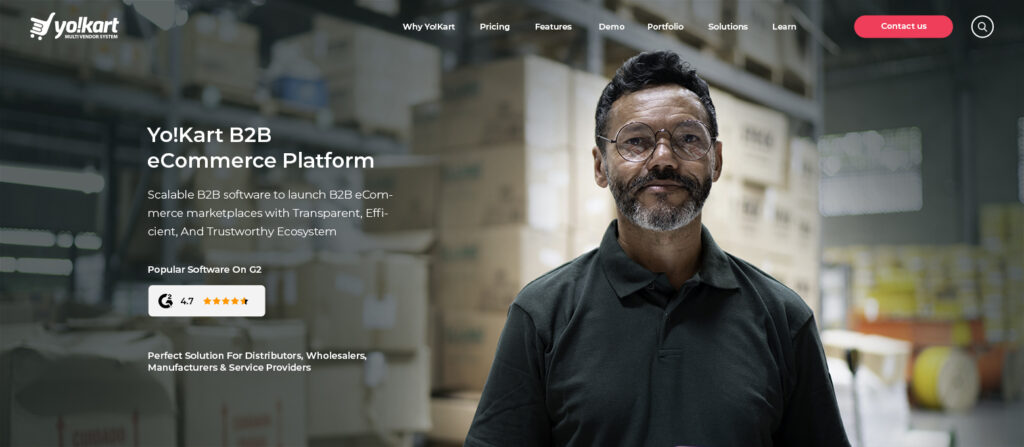
Yo!Kart B2B is one of the leading B2B eCommerce marketplace software and the only readymade marketplace platform in this list. It lets entrepreneurs, small-medium businesses (SMBs), and enterprises to get started with an eCommerce marketplace business right off the bat. If needed, The B2B eCommerce solution is extensively customizable to meet individual business requirements.
Yo!Kart B2B has been designed from the ground-up, using an in-house framework. It has been built after years of experience ― working with businesses to offer custom B2B solutions. It imbibes all that accumulated knowledge to offer purpose-built B2B-specific features and pre-integrations ― out-of-the-box.
Furthermore, to support the critical B2B eCommerce requirement of competitive pricing strategies, the solution is offered under one-time pricing plans. There are no recurring or hidden charges thereafter. This reduces the overheads for a business, giving them a long-term competitive advantage.
This one-time bundled pricing plan includes a license for a lifetime of use, source code ownership, one year of free technical support, and other services. Furthermore, to allow scalable B2B operations, this self-hosted B2B marketplace software gives businesses the freedom to choose hosting providers, and scale undeterred. Yo!Kart B2B marketplace platform is a scalable and versatile solution, suitable to build marketplaces of varying scale.
UNI Diamonds and Bozinga are two of the prime B2B marketplaces powered by Yo!Kart B2B.
Key B2B Features of Yo!Kart:
- Readymade B2B marketplace software – no plugins required.
- In-built Request for Quote (RFQ) module with an option to accept, reject or place a counteroffer
- Option to list Services alongside products – bundled or exclusively.
- Individual vendor storefronts
- Product catalog management
- Minimum order quantity
- Bulk order discount
- Intuitive user interface with an in-house content management system
- SEO-Friendly B2B eCommerce Platform and more
- Extensively customizable and tested scalability.
- Buyer, and seller direct communication channels.
- Hide Product prices to allow the scope of negotiations.
- Part payments option for the buyers.
Let us see how the RFQ settings work on Yo!Kart B2B platform through this video tutorial:
Limitation:
- Yo!Kart B2B software has no free themes
- First-time users need to invest time to learn and operate the system completely.
Pricing: Yo!Kart B2B (one-time payment) bundled pricing packages start US $1499. As mentioned, this price includes the license, source-code, 1-yr tech support, and other services.
Overall Rating: Yo!Kart has a rating of 4.6 on G2 and 4.2 on Capterra.
Get an Overview of All B2B Features of Yo!Kart
2. BigCommerce
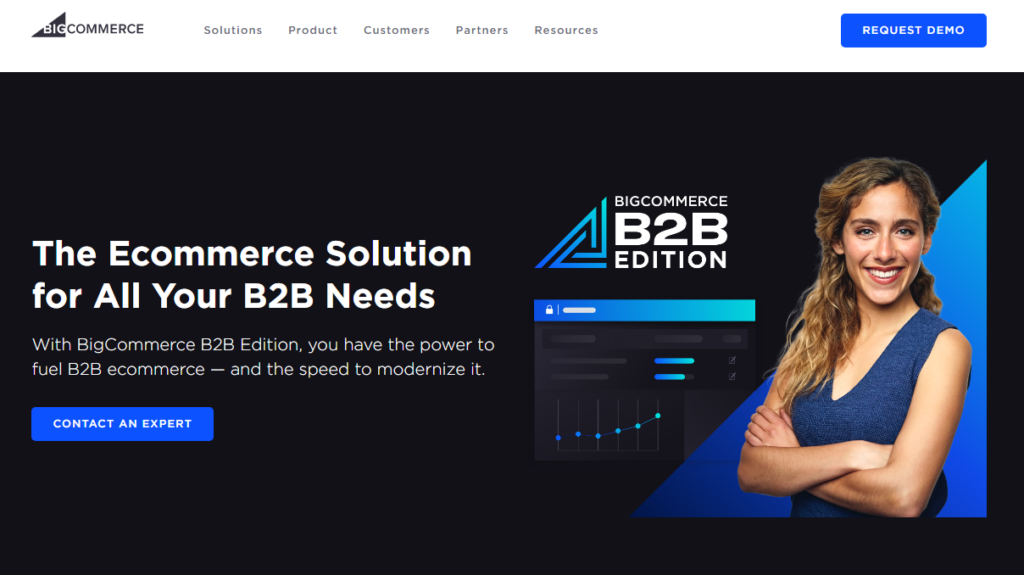
BigCommerce is one of the popular open-source SaaS-based B2B eCommerce platforms that comes with a variety of B2B features and tools to modernize buying for retailers, distributors, and manufacturers. The B2B eCommerce platform enjoys an abundant library of third-party plugins for businesses to embed into their business.
The B2B ecommerce platform is fully secure, feature-rich, and has two prominent plans – pro and enterprise, specifically targeted for the B2B sector. Apart from this, BigCommerce has also partnered with BundleB2B – a B2B enterprise software – to leverage businesses to fuel eCommerce and ensure a better buying experience. The B2B edition is essentially BigCommerce’s enterprise plan with a pre-installed BundleB2B app and six pre-installed themes to choose from.
Key B2B Features of BigCommerce:
- Abandoned cart saver
- Multiple payment methods
- Real-time shipping quotes
- Request for Quote option
- Bulk buying discounts and custom promotion feature
- Corporate account management to set up buyers roles and permissions
- Invoice portal to manage and pay invoices online
- Payment method visibility control to manage or restrict access of certain payment options
Limitation:
- Requires paid third-party plugins for several essential functionalities like automated shipping management
- Comes with similar themes
- Has Limit on yearly sales, forcing an upgrade
- Support isn’t reliable
Pricing: BigCommerce B2B platform comes in four unique packages – Standard at $29.95/month, Plus at $79.95/month, Pro at $299.95/month, and Enterprise Plan at RFQ. Also, the BigCommerce B2B edition is essentially an enterprise plan + BundleB2B app.
Overall Rating: BigCommerce has a rating of 4.2 on G2 and 4.3 on Capterra.
3. Magento (Now Adobe Commerce)
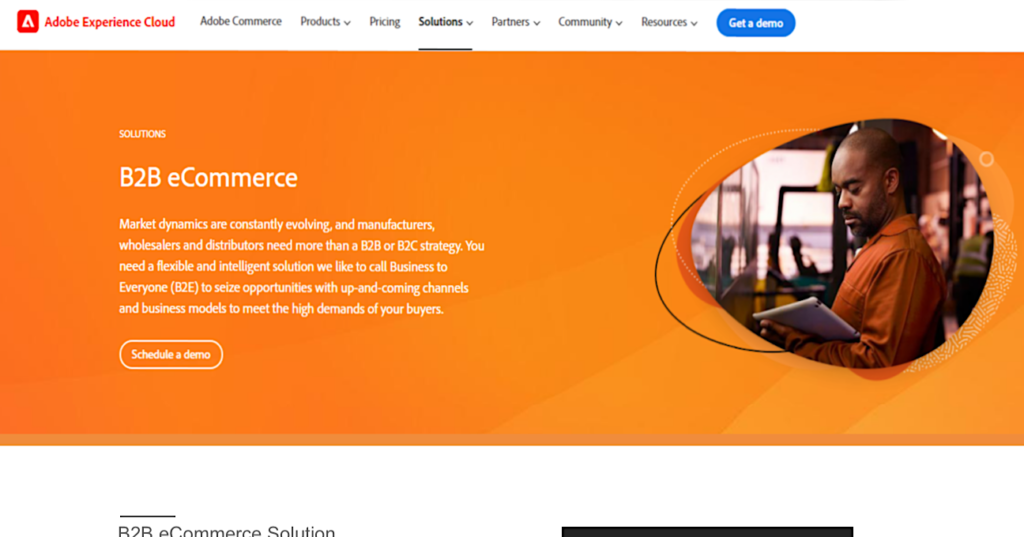
Magento is an open-source eCommerce platform written in PHP for businesses to cater to the unique eCommerce demands of buyers. The platform is highly flexible and suited for both B2C and B2B businesses but, it requires a dedicated Magento eCommerce development team. Magento is owned by Adobe and comes with an enterprise offering called Magento commerce.
The popular B2B eCommerce platform, Magento offers digital solutions to manage wholesalers, distributors, and manufacturers in a B2B online store. Magento comprises a vast extension library of resources to build a flexible eCommerce store. The platform is suitable for both small-scale businesses and large-scale enterprises.
It is a customizable B2B eCommerce platform that allows businesses to create, and manage, B2B eCommerce websites, creating a personalized experience. Although, The B2B software requires a dedicated development team to build a B2B eCommerce store with complete control over the operations.
Key B2B Features of Magento:
- Request for Quote directly from the shopping cart
- Self-service tools to manage buyer roles and permissions
- Faster re-ordering in a couple of clicks
- Flexible fulfillment options, including shipping and in-store pickup
- In-depth insights and reports with native business intelligence tools
- An automated order approval process as defined by the businesses
- Managing multiple buyers and complex organizational structures
- Drag-and-drop merchandising and content tools to easily manage your store
Limitation:
- Unlike other B2B eCommerce platforms, Magento is an expensive solution. While Magento open-source software requires a dedicated development team, the cost of Magento commerce the readymade solution, is priced even higher.
- Finding the right Magento development team that delivers actual results is difficult
- Magento structure is large and highly complex
- It requires a dedicated hosting server to ensure optimal performance and loading speed
Pricing: Magento open source is free to use but requires a dedicated development team. The pricing for the Magento commerce edition depends upon annual gross merchandise volume (GMV) and average order value. Below is a reference of cost structure for the Magento Commerce and Commerce cloud edition.
| Average Gross Sales Revenue | Magento Commerce Cost | Magento Commerce Cloud Cost |
|---|---|---|
| < $1,000,000 | $22,000/year | $40,000/year |
| $1,000,000–$5,000,000 | $32,000/year | $55,000/year |
| $5,000,000–$10,000,000 | $49,000/year | $80,000/year |
| $10,000,000-$25,000,000 | $75,000/year | $120,000/year |
| $25,000,000+ | $125,000/year | $190,000/year |
Overall Rating: Both Magento Open Source and commerce have a rating of 3.9 on G2.
B2B Marketplace platform extension by CedCommerce
Although Magento is in itself not a B2B marketplace software, the addition of third-party plugins helps to achieve that. The B2B Marketplace extension by CedCommerce is an efficient solution for Magento store owners to convert their stores into a B2B marketplace platform with advanced functionalities for store owners, sellers as well as buyers. It is a faster and scalable method to expand websites into feature-filled shopping malls and is also a preferred choice in the Magento community.
CedCommerce enjoys bronze solution partnership with Adobe and deploys certified professionals for all its projects. It is also popular for its all-time available dedicated support to ensure a smooth implementation. Its portfolio consists of hundreds of successful B2B marketplaces that it has built since 2010.
Some of the most liked offerings in the Basic and Pro packages of its B2B extension include:
- Manage unlimited products and categories
- Multiple Offline and Online payment methods
- Bulk Orders processing
- Advanced product search
- Default commission for admin
- Social logins for vendors and buyers
Get a standalone multivendor solution with in-house customization team
4. Shopify Plus
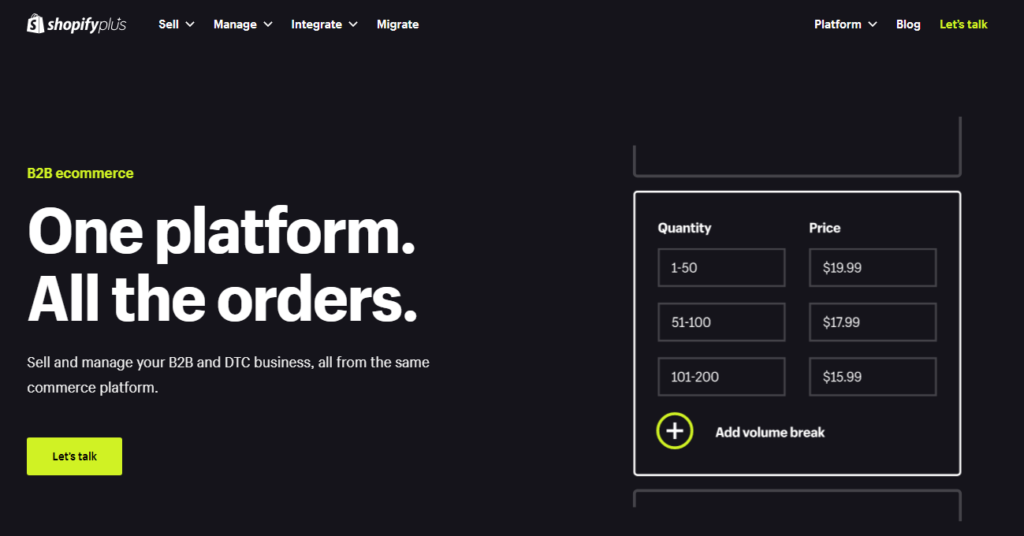
Shopify Plus is an enterprise eCommerce platform by Shopify, designed solely for enterprises. It is a popular B2B eCommerce solution with omnichannel support, automated workflows, flexible APIs, and more. The platform is highly intuitive with a streamlined checkout system.
Shopify Plus enables enterprises to manage both B2B and DTC businesses with separate storefronts. There are more than 10,000 brands that use Shopify Plus worldwide to streamline business operations. The platform allows businesses to enhance the retail experience with customizations via third-party integrations through Shopify apps and Partners. For businesses looking to fully harness its capabilities, professional Shopify Plus development services can help build scalable, optimized, and customized solutions tailored to growth.
Key B2B Features of Shopify Plus:
- Volume-based pricing with minimum/maximum thresholds
- Automate and review wholesale account signups
- 24×7 self-serve ordering
- Review orders before invoicing
- Customized invoice email to pay the invoice using a preferred payment method
- Real-time sales tax calculation during checkout via Avalara AvaTax
- Set different prices for different customers or a fixed price for variants
- Set shipping rates for customers
Limitation:
- Any customization to the back-end is either limited or not possible
- Limited APIs minimize store’s flexibility
- Lack of in-depth native reporting functionality for large stores
- Locked checkout functionality restricting complete access over checkout funnel
Pricing: Shopify Plus pricing starts at $2000/month for standard installation and integrations. For businesses with large volumes, a variable fee is charged as per the requirements. Contact Shopify Plus experts for more details.
Overall Rating: Shopify Plus has a rating of 4.4 on G2 and 4.8 on Capterra.
5. Oracle Netsuite
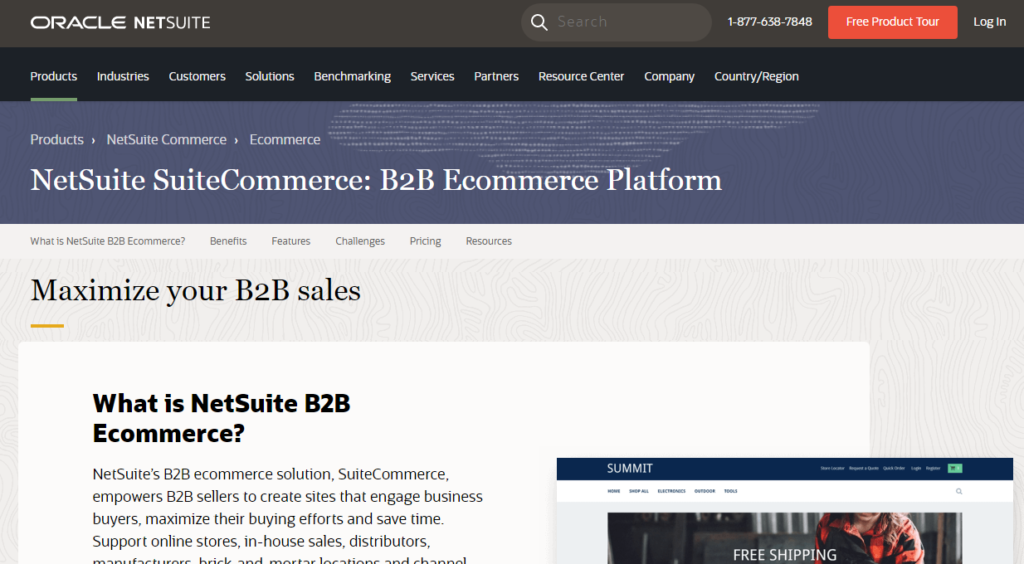
NetSuite’s B2B eCommerce platform SuiteCommerce is designed for B2B sellers to maximize their efforts while saving time. Suitecommerce comes well supported by NetSuite’s inventory management system, Enterprise resource planning (ERP) system, Customer relationship management (CRM) system, and more.
With unified offerings from NetSuite; wholesalers, distributors, and retailers are better equipped to manage stock supplies and speed up order fulfillment. The B2B eCommerce platform comes with mobile-optimized pre-designed templates, a centralized repository of customer information from all channels, quick drag-and-drop editing functionality, and much more.
SuiteCommerce is a highly adaptive, customizable cloud-based solution offering complete control/visibility to business owners. The eCommerce software enables businesses, including brick-and-mortar stores, to engage with customers on multiple channels building a personalized experience. NetSuite’s native eCommerce offering is scalable, comes with an intuitive user interface (UI), and is designed to optimize the B2B eCommerce experience for businesses
Key B2B Features of Oracle NetSuite’s SuiteCommerce:
- Native integration with Netsuite’s eCommerce, point of sale (POS) system, inventory management, and more
- Request a quote and automatically convert quotes to sales orders once approved.
- A centralized dashboard for buyers to view invoices and make full or partial payments
- Set up automated checkpoints to hold or approve wholesaler registration
- Drag-and-drop functionality to edit and publish site changes
- Real-time reporting and analytics
- Native and third-party extensions to easily implement new features/functionalities
- Streamlined and secure checkout process to minimize cart abandonment
Limitation:
- Limited capability to integrate third-party products (not included in NetSuite)
- Complex setup and overwhelming for a beginner to learn the system
- Development and new integrations can be challenging, requires a dedicated NetSuite developer
- Not intended for an online marketplace setup
Pricing: NetSuite’s SuiteCommerce pricing starts at $40,000/year. This includes the core platform, optional modules, and the total number of users. The installation fee is charged extra.
Overall Rating: NetSuite’s SuiteCommerce has an overall rating of 3.1 on Capterra.
6. NuORDER (By Lightspeed)
NuORDER is a top B2B eCommerce platform by the leading payment solutions provider Lightspeed. Developed in the year 2005, It originates from the city of Montreal in Canada. It is a SaaS solution that includes showroom technology and merchandising tools. Like most leading B2B eCommerce platforms, NuORDER also offers integrated payment solutions. These have features that simplify bulk transactions, typical to B2B eCommerce.
NuORDER has been developed to facilitate merchants in the B2B domain to ease business expansion. Moreover, it also leaves satisfactory customer experiences.
Furthermore, NuORDER also comes with functionalities to aid in global eCommerce operations.
Key B2B features of NuORDER
- The B2B eCommerce platform offers ease of use
- The payment gateway is integrated OOTB.
- Drag and Drop site builder
- Invoicing to ease processes for sales reps.
- Integration with ERP, PLM, PIM, and POS can be made available.
- Order Management features.
- Streamlines offline and online selling for the vendors.
Limitation:
- Many features are missing or are available only as paid add-ons.
- Clients have reported issues with customer support.
Pricing: The pricing for NuORDER can be requested via online quote.
Rating: NuORDER has been rated at 4.1/5 on Capterra and 3.9/5 on Gartner Peer Reviews.
7. StoreHippo
StoreHippo is also one of the leading SaaS B2B eCommerce solutions. Based out of India, StoreHippo has been used in 15+ countries. It is a robust B2B eCommerce platform designed to cater to wholesale, distribution, and other B2B business needs. The B2B eCommerce solution utilizes the MACH architecture. This helps it in leveraging microservices-based B2B platforms. Hence the clients can opt for incremental functionalities on top of the base packages offered.
Furthermore, StoreHippo also has APIs built for its B2B platform. This makes it ready for integration. It offers multi-vendor marketplace support, tailored workflows, and a mobile-first platform. There are also features like multi-currency support, customizable pricing, and integration with ERP and CRM systems. StoreHippo is also secure, with extensive analytics, and marketing tools.
Key B2B features of StoreHippo B2B eCommerce Solution
- Software for multi vendor B2B marketplace.
- Workflows can be customized.
- Builds responsive websites that can be viewed from users’ desktops, tablets, or mobile devices.
- Multi-Currency and Multi-Lingual Support.
- Sellers can customize the pricing of their products.
- Flexible architecture allows integration with ERP and CRM business tools.
Limitations:
- Customizing the platform needs established technical expertise
- The learning curve is higher.
- Adding incremental features can lead to higher overall costs.
- Limited integrations OOTB.
Price: The pricing for SaaS B2B platform, StoreHippo ranges from $199/mo to $1999/mo.
Rating: StoreHippo is rated 3.9/5 on G2.
8. Intershop
Founded in 1992, Intershop is a popular B2B eCommerce solution from Germany. It is one of the early turnkey eCommerce products developed in the industry. Ever since the first product came out, Intershop has focused on B2B eCommerce.
The platform has been developed considering the complexities of B2B eCommerce. It is cloud-based, supporting functionalities for managing orders, information, and customers. There are also business intelligence tools including analytics that feed data for key strategic decisions.
Just like StoreHippo, Intershop is also based on a microservices platform, that allows it to offer incremental functionalities as a pay-as-you-use business model to its clients. This makes it a flexible B2B eCommerce platform for businesses of varying needs.
Intershop can be used by diverse B2B industries including retail, wholesale, or manufacturing. It has 300+ clients including United Refrigeration, TRUMPF, and Grupo Electro Stocks.
Furthermore, the German B2B eCommerce platform is secure, meeting European compliances such as GDPR, and it is hosted on Microsoft Azure.
Key B2B Features of Intershop
- Allows vendors to manage their sales channels from the platform.
- Software for multi vendor B2B marketplace.
- Product Catalog to list the products.
- Features to manage bulk ordering and reordering.
- Product pricing can be customized.
- Flexible architecture that allows integration with other third-party solutions.
- Reporting and Analytics tools.
- Hosted on Microsoft Azure.
Limitations:
- Customization is a complex process.
- Intershop can be an expensive solution.
- Intershop is focused towards enterprises, SMBs can find it out of their scope.
- Third party solutions are needed to cover essential eCommerce features, adding to complexities.
Pricing: Intershop has 3 tiered pricing models i.e. Esential, Advanced, Professional. The prices of all of these is available via quotation.
Rating: The B2B marketplace software is rated 4.4/5 on G2 and 4.4/5 on Gartner Peer Reviews.
9. Shopware
Shopware is another B2B marketplace software that originates from Germany. It was designed in 2000 by Stefan Hamann. It quickly gained traction all over Europe.
The B2B eCommerce software is available as an open source community edition and as a SaaS solution. It is scalable and can be extensively customized. Like all leading B2B eCommerce solutions, Shopware has a flexible architecture and supports integration with multiple third party solutions.
Since the solution caters to both B2C and B2B, just like Yo!Kart, Shopware also has all elements of B2C eCommerce in its B2B solution. For instance, it has an engaging UI/UX. It has marketing tools with personalized content delivery. Then there are multiple SEO optimization and promotional capabilities. Also included is an easy to use CMS for seamless content management.
Moreover, as a B2B eCommerce software, Shopware has B2B functionalities to meet the needs of wholesale and manufacturing businesses. These features give B2B businesses capabilities for managing complex customer relationships, negotiable pricing, and bulk ordering processes.
Like all leading open-source eCommerce solutions, Shopware community edition too has a community of developers around it. The customization needs of businesses are routed via this community.
Key B2B Features of Shopware
- Buyers can be grouped with personalized pricing, exclusive to the group.
- Streamlines bulk orders and frequent orders, pivotal for B2B transactions.
- Customized product catalogs for different buyer segments.
- Quote management for price negotiations.
- Account Management for businesses.
- Marketing, Promotional, and SEO tools.
- Approval workflows allow the marketplace operators(s) to monitor the platform effectively, ensuring all compliance requirements.
Limitations:
- Complex, needs technical expertise.
- Learning Curve, requires a thorough understanding from the users.
- For the open source solution, customization is highly necessary for use.
Pricing: Shopware community edition (open source) is free to download. Otherwise Shopware is available in three priced packages i.e. Rise, Evolve, and Beyond. Prices for rise is $600/month, while Evolve and Beyond are available quotation basis. Interestingly, Shopware is also available as a PaaS, and a self-hosted solution, but the prices remain the same as the cloud-hosted multi vendor B2B marketplace platform.
Rating: Shopware is rated 4.0/5 on G2.
10. SAP Commerce Cloud
Back in the early 2000s, a German company called Hybris designed an eCommerce and product CMS. It was called the SAP Hybris then. In 2013, acquired this solution and integrated it with their broad spectrum of software. This solution was then rebranded as SAP Commerce Cloud.
This B2B eCommerce software is cloud based solution, tailored to the needs of bigger businesses and enterprises. It offers rich features such as an advanced product catalog, order management, customer data management, and omnichannel commerce.
The B2B platform is integrated with ERP systems which also includes SAP’s very own i.e. SAP Sales Cloud, SAP ERP, and SAP Customer Data Cloud. SAP Commerce Cloud is scalable and can cater to the needs of both B2C and B2B eCommerce market needs. It is used by multiple enterprises globally from retail, automotive, manufacturing, and consumer goods industries.
The biggest draw of SAP Commerce Cloud for Enterprises is holistic SAP solutions offered as a unified platform ecosystem.
Key B2B Features of SAP Commerce Cloud
- Advanced Product Catalog.
- Advanced Order Management.
- Supports Complex Pricing Structures.
- Omnichannel eCommerce capabilities.
- Integratated with SAP suite of enterprise solutions.
Limitations:
- High Cost, making it out of scope for SMBs
- Very complex system which requires high maintenance investment.
- Because of its complexities, customization is expensive and time-consuming.
- Typical SaaS restrictions like vendor lock-ins.
Pricing: The pricing for SAP Commerce Cloud is complex and is available in multiple options. It starts with SAP Commerce Cloud, sandbox environment, small, priced at $ 53,184. Next is SAP Commerce Cloud, sandbox environment, medium, available at $98,928, then there is SAP Commerce Cloud, sandbox environment, large for $330,900, reaching upto SAP Commerce Cloud, sandbox environment, x-large for $1,048,584.
Rating: SAP Commerce Cloud is rated at 4.2/5 on Gartner Peer Insights and 4.2/5 on G2.
How do I choose the right B2B eCommerce platform?
The B2B platform will be at the heart of the business, the key to all participants (Admin, Sellers, and Buyers) performing their roles efficiently. Moreover, it will be a tool to manage day-to-day eCommerce operations, the cornerstone of business brand identity and future scalability. Furthermore, costs involved in the maintenance and future customizations will impact the long-term value of the platform, and in turn the business health.
The list of considerations can be a lot more and will change as per the scope and nature of the business. For these reasons, choosing the right software for your business is of utmost importance. We discuss some parameters, on which various B2B eCommerce software vary.
- Essential B2B features – B2B eCommerce varies vastly from B2C. Longer Sales Cycles, negotiations, bulk purchases, Buyer-Sellers business relations, and many other factors underpin B2B commerce. Your B2B eCommerce solution must include essential eCommerce features that allow business to conduct their business activities just like they would in the real world. So B2B-specific functionalities like Request For Quote (RFQ) module, Enabling minimum order quantity, flexible payment options, integration to backend systems like ERP, CRM, and more are critical modules or integration essential for all B2B businesses to operate and streamline operations.
- Hosted or Self-Hosted B2B Platform – A hosted B2B eCommerce solution offer hosting services alongside eCommerce software ― the website is hosted on the providers’ servers. The client typically pays recurring subscription charges to use both the software and hosting services to a single source. These eCommerce solutions take care of your security concerns as well as any issues with bugs/errors but there is limited or no customization to personalize your store. Hosted B2B eCommerce solutions are subscription-based platforms that charge a monthly/annual fee plus transaction charges and other associated fees. Also, store owners are tied to using SaaS APIs for any integration with an existing business system. Shopify, BigCommerce are two prime examples of a hosted B2B ecommerce solution.
On the other hand, a self-hosted B2B eCommerce solution is one that provides complete control over your business with source code ownership. You are free to customize, and choose a hosting provider that is best suited, Self-hosted B2B eCommerce software are flexible enough to integrate with existing business systems, allow implementation of new security measures, and ensure compliance with stringent policies such as GDPR compliance. Yo!Kart is a leading self-hosted B2B eCommerce solution. - Total Cost of Ownership (TCO) – The total cost to set up and manage the eCommerce business is termed as TCO. This cost includes software license cost (recurring in case of hosted solutions), recurring transaction charges (if applicable), maintenance cost, additional modification/customization cost, and more. Estimating the TCO is a critical evaluator when choosing a B2B eCommerce platform.
- Customization – The scope of customization is immense ― right throughout the eCommerce lifecycle of an online business. For instance:
1. For a tailored launch, front-end customizations might be needed for specific branding goals, backend customizations will allow integration of existing company tools or business-specific integrations like payment gateways popular in a specific region.
2. Mid-cycle considerations may include re-platforming, due to cost, technology, or other considerations.
3. A matured eCommerce business might consider scaling the business to include more product categories, cover more regions, add sellers, or any other way.
Thus, the goals of a business vary throughout the eCommerce lifecycle, and an online business will need the support of reliable customization services.
Most eCommerce B2B platforms vary, in this regard. Some come with little customization options, some need to be customized by external teams, while some have the support of in-house teams.
Boost B2B eCommerce Success with Our Tailored Solution
Conclusion
Now that we’ve reviewed the best B2B eCommerce platforms, this will narrow down your choices and help you identify a stable off-the-shelf B2B eCommerce solution that meets your business requirements. Remember to evaluate all your options, take a live demo (if possible), review customization possibilities via eCommerce development services, and more before making the decision.
B2B eCommerce Platforms – FAQs
1. How is an online B2B marketplace different from a B2C marketplace?
In a B2B marketplace, online transactions and sales are facilitated between two business entities (such as a wholesaler, distributor, or manufacturer) whereas, in a B2C marketplace, a business sells products/services to customers directly. Alibaba.com is a B2B eCommerce marketplace whereas Amazon.com is a B2C marketplace.
Furthermore, B2B interactions typically involve longer sales cycles, high-value & high-volume transactions, negotiations, logic & value-driven purchase decisions, buyer-seller business relationships, and more.
B2C interactions may not necessarily involve all of these factors.
2. What is B2B2C eCommerce?
B2B2C eCommerce is when B2B businesses with no Sales channel to reach consumers directly, partner B2C businesses to achieve this objective.
So, in a B2B2C partnership:
B2C businesses offer an established ecosystem and a customer base to the B2B businesses.
B2B businesses get a sales channel via the B2C businesses to reach the consumers directly.
3. Is Amazon a B2B or B2C company?
Amazon is both a B2B and B2C company. Amazon.com, a more popular offering, is a B2C eCommerce marketplace where businesses sell to consumers, whereas Amazon Business is a B2B eCommerce marketplace where businesses sell to other businesses.
4. What are the types of B2B eCommerce marketplace?
B2B eCommerce can be differentiated on many parameters. Let’s understand the differentiation based on the role of the participants of the marketplace.
- eDistributorship: A marketplace where multiple sellers list their products or services on the platform. Buyers log in and buy those products or services.
- eProcurement: A marketplace where buyers post their requirements for products and services. Sellers then respond to the requirements with appropriate products of services they have to offer.
- Intermediary oriented. In this marketplace, middleman liaisons between buyers and sellers for commerce to take place on the platform.
Suggested Read: All types of B2B marketplaces explained in detail





